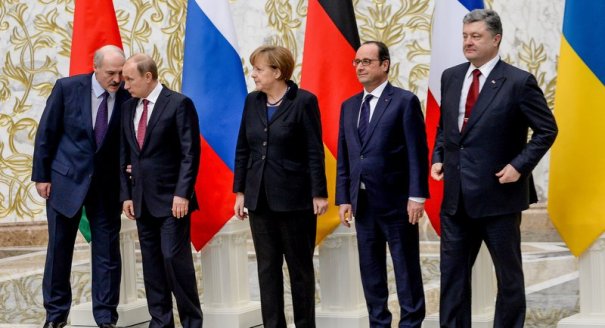More than a month has passed since the Minsk II agreements were signed on February 11. Fighting in the Donbas has quieted, though Kyiv has tabulated over a thousand ceasefire violations since the ceasefire was agreed upon. Compared to Minsk I, signed on September 5, the second provides a significantly better political framework for peace. However, all sides have competing interests at stake, and as a result, frequently contradictory interpretations of this framework. Indeed, if Minsk II is successful and the conflict in the Donbas ultimately freezes, Moscow will likely continue to destabilize other parts of Ukraine to prevent it from reorienting toward the West.
Ukraine, Russia, and the West each have their own red lines, many of which are dictated by domestic political agendas. Kyiv, for example, can neither admit its defeat nor agree to a Russia-brokered peace with the separatists. Russia can neither admit its war against Ukraine nor let the rebels fail. The West can neither give Ukraine the means to defend itself militarily and avoid economic collapse nor admit that Russia has more at stake in the crisis. These competing agendas present long-term impediments to a resolution of the conflict.
The founder of this doctrine is Vladimir Gorbulin, a former national security adviser to President Leonid Kuchma who now advises President Poroshenko. If this doctrine prevails, what will it look like? Unable to defeat Russia militarily, Ukraine can only secure a victory by political means. Gorbulin’s doctrine posits that Ukraine needs to prove that it is capable of resistance, not allowing Moscow to dictate the terms of Kyiv’s relationship with the outside world. Western political unity in support of Kyiv is the key element of this strategy.
The implementation of this strategy relies not only on effective institution building (such as modernizing the armed forces), but also on waging an information war at home and in the West. Reported arms “deals” with Lithuania, the UAE, and others, and an appeal for an international peacekeeping mission are all part of Ukraine’s information strategy. While Russia wages its hybrid war against Ukraine, Kyiv is trying to use peaceful, hybrid methods to engage the West in its struggle—although not all the information it puts out is fully verifiable (and sometimes it is downright untrue). For example, in place of holding an official investigation into the killing of scores of protesters and police officers in February of 2014, the head of the Security Service of Ukraine simply accused Vladislav Surkov—one of Putin’s advisers and a frequent visitor to Kyiv—of being in charge of a Russian sniper unit on the Maidan (an assertion that was later called into question by the Ukrainian General Prosecutor’s office).
The Minsk agreements are fragile.How effectively they are implemented will depend primarily on the Europeans’ ability to convince Moscow to pressure separatists into observing the ceasefire, and on Kyiv’s ability to keep nationalist militias in line. If either side fails to do so, the fighting is likely to resume.
Contrary to conventional wisdom, the city of Mariupol unlikely to be the next battlefield in the Donbas. The separatists may be able to circumvent it by using the Berdyansk’ airport that Rinat Akhmetov is trying to acquire. An assault on Mariupol might diminish its value as a functional port city. By attacking a Russian-speaking population, it would undermine Moscow’s narrative that it seeks to protect the interests of Russian speakers. Although popular dissatisfaction with Kyiv is growing in the region and Mariupol oligarchs and separatist authorities signed a memorandum on order and security last May, that memorandum does not mean the residents and local business leaders in Mariupol would prefer to be folded into the separatist republics.
Thus, the residents of Mariupol are caught in a bind. They agree that life under separatist authorities would not be easier and are worried about being cut off from Russian markets. Yet many working class residents are not optimistic about Ukraine’s future and are fearful of Ukrainian nationalist volunteer battalions they believe have brutalized some local populations in the east. The much-discussed land corridor to Crimea that Russia presumably needs to sustain the peninsula does not need to include Mariupol. Gas, water, electricity, and food travel to Crimea from other parts of Ukraine. If Kyiv actively pursues a policy of isolating and blockading the peninsula—based on legitimate political and security concerns—Russia and the separatists may have no other choice but to re-open the front there. Continued restrictions at the border between Ukraine and Crimea, fragile coal supplies, unpredictable gas negotiations, and trade relations that increasingly resemble a short-term barter system do not inspire much hope for the region.
The Kremlin understands that it cannot win Ukraine back through military means alone. The Russian public is not supportive of a full-scale war with Ukraine, so Moscow needs to take pressure off of its military. It also understands that the best way to foment unrest in other parts of the country and undermine Ukraine’s integration with the West is to exploit corruption, the rapidly worsening economic and social situation, and oligarchs’ dueling interests. In light of this, Moscow will likely pressure the separatists to freeze the conflict in the Donbas and try to shift its focus to undermining the fragile political situation in Kyiv.
A covert campaign to destabilize the Ukrainian government would play on Kyiv’s existing internal divisions and may turn out to be the Kremlin’s best weapon. The fight for Ukraine’s future could move into a new phase of hybrid warfare, increasing the risk of Russian-sponsored “soft” terrorism. Unless Kyiv can kick-start the country’s ailing economy, attempts by some in Ukraine’s leadership to isolate the country from Russia will make life even worse for those in the south-eastern regions who are most dependent on eastern markets. This may further disharmonize the relationship between Kyiv and the regions and pave the way for an opposition victory in the upcoming local elections. South-eastern Ukraine may strike back.





